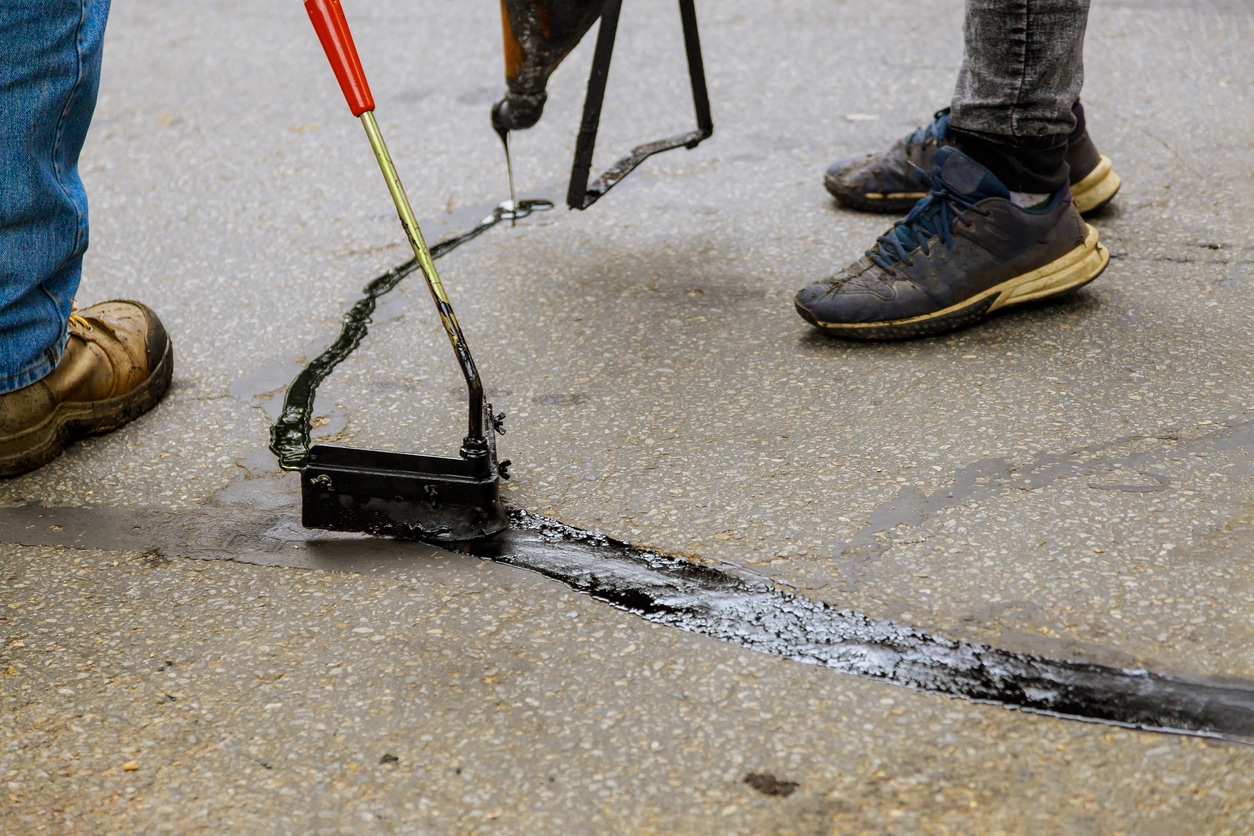Elevate Safety and Appeal: Angled Car Park Solutions with Asphalt Sealing
Elevate Safety and Appeal: Angled Car Park Solutions with Asphalt Sealing
Blog Article
Warm Mix Asphalt: A Sustainable Service for Pavement
Hot Mix Asphalt (HMA) has actually become a leading lasting option for sidewalk solutions, providing a myriad of ecological advantages and ingenious innovations. Its capability to reuse products and reduce energy consumption presents a compelling instance for its adoption in roadway construction jobs. Additionally, the long-term performance and resilience of HMA make it a preferred alternative for infrastructure growth. As the demand for environment-friendly building techniques grows, discovering the nuances of HMA's sustainability can provide important understandings into the future of pavement options.
Ecological Benefits of Warm Mix Asphalt

Additionally, Hot Mix Asphalt aids to minimize city warmth island effects. Its dark color soaks up sunlight, minimizing the quantity of warm reflected back right into the environment contrasted to lighter-colored pavements. This can reduce ambient temperature levels in metropolitan areas, decreasing the need for cooling and eventually minimizing energy consumption.
On top of that, Warm Mix Asphalt adds to improved stormwater monitoring. Its porous nature enables water to charge and penetrate the sidewalk groundwater supplies, lowering overflow and the danger of flooding. These ecological advantages make Hot Mix Asphalt a sustainable selection for paving roadways and freeways.
Energy Performance in HMA Manufacturing
Is power performance a critical aspect in the production of Warm Mix Asphalt (HMA)? Power plays a significant function in the manufacturing of HMA, impacting both price and environmental sustainability. One crucial element of power efficiency in HMA manufacturing is the use of cozy mix asphalt (WMA) modern technologies.
Additionally, improvements in plant innovations have actually led to even more energy-efficient HMA manufacturing processes. By maximizing energy usage in HMA production, the sector can lower its carbon impact while maintaining high-grade pavement materials.
Recyclability of Hot Mix Asphalt
The recyclability of Warm Mix Asphalt (HMA) is a crucial aspect of its sustainability and lasting ecological effect. HMA is one of the most recycled products in the USA, with over 100 million lots of recovered asphalt sidewalk (RAP) being recycled each year in brand-new pavement construction. Recycling HMA offers numerous environmental advantages, such as minimizing the demand for virgin materials, decreasing energy consumption throughout manufacturing, and lowering the quantity of waste sent out to garbage dumps.
The procedure of reusing HMA entails crushing the existing pavement, squashing it into smaller pieces, and mixing it with new aggregate and asphalt binder to create a recycled mix. This recycled mix can commonly carry out in addition to or perhaps far better than standard HMA, while requiring fewer resources and generating lower greenhouse gas discharges. By incorporating RAP into new sidewalk projects, road firms can save natural deposits, decrease costs, and decrease the environmental impact of roadway construction and maintenance activities. Generally, the recyclability of HMA plays a significant duty in advertising sustainable techniques within the sidewalk sector.

Long-Term Efficiency of HMA
Asphalt sidewalks show durability and strength over an extensive duration, showing the long-lasting performance of Warm Mix Asphalt (HMA) In addition, innovations in HMA modern technology, such as the usage of polymer-modified binders and warm mix asphalt, have actually additionally improved the longevity and long life of HMA sidewalks. By focusing on high quality building and construction and upkeep methods, HMA continues to prove itself as a lasting and economical service for resilient sidewalk facilities.

HMA: Sturdiness and Sustainability
Showing both resilience and sustainability, Warm Mix Asphalt (HMA) has actually ended up being a keystone in the construction of long-lasting sidewalk facilities - regrading. HMA's longevity comes from its capability to stand up to hefty lots, extreme climate conditions, and high traffic volumes, making it a trustworthy selection for streets, highways, and flight terminal paths. The composition of HMA, which usually consists of accumulations, binder, and filler, plays an important function in boosting its longevity and resistance to tear and put on
In addition, HMA's sustainability depends on its recyclability and energy-efficient production procedure. The capacity to recycle reclaimed angled parking asphalt sidewalk (RAP) in brand-new HMA blends minimizes the need for virgin products and decreases the ecological impact of pavement building and maintenance. Additionally, the energy efficiency of creating HMA hinges on its reduced blending temperature levels contrasted to various other sidewalk products, bring about reduced energy usage and greenhouse gas discharges.
Verdict
Finally, hot mix asphalt (HMA) provides a sustainable solution for pavement with its eco-friendly attributes. HMA's recyclability, energy effectiveness in production, and long-lasting longevity make it an environmentally friendly choice for roadway building and construction. By saving natural deposits, minimizing waste, and lowering greenhouse gas discharges, HMA plays an important role in promoting sustainability in infrastructure growth. Its capacity to minimize urban warmth island impacts further emphasizes its importance in developing ecologically mindful and resilient sidewalk systems.
HMA is one of the most recycled products in the United States, with over 100 million heaps of redeemed asphalt pavement (RAP) being recycled each year in new sidewalk building.The procedure of recycling HMA includes milling the existing sidewalk, squashing it into smaller sized pieces, and blending it with new aggregate and asphalt binder to produce a recycled mix.Asphalt sidewalks demonstrate sturdiness and strength over an extended duration, reflecting the long-lasting efficiency of Warm Mix Asphalt (HMA) Furthermore, innovations in HMA technology, such as the usage of polymer-modified binders and cozy mix asphalt, have better boosted the sturdiness and long life of HMA pavements. The capability to recycle redeemed asphalt sidewalk (RAP) in new HMA combinations lowers the demand for virgin materials and minimizes the environmental effect of pavement building and construction and maintenance.
Report this page